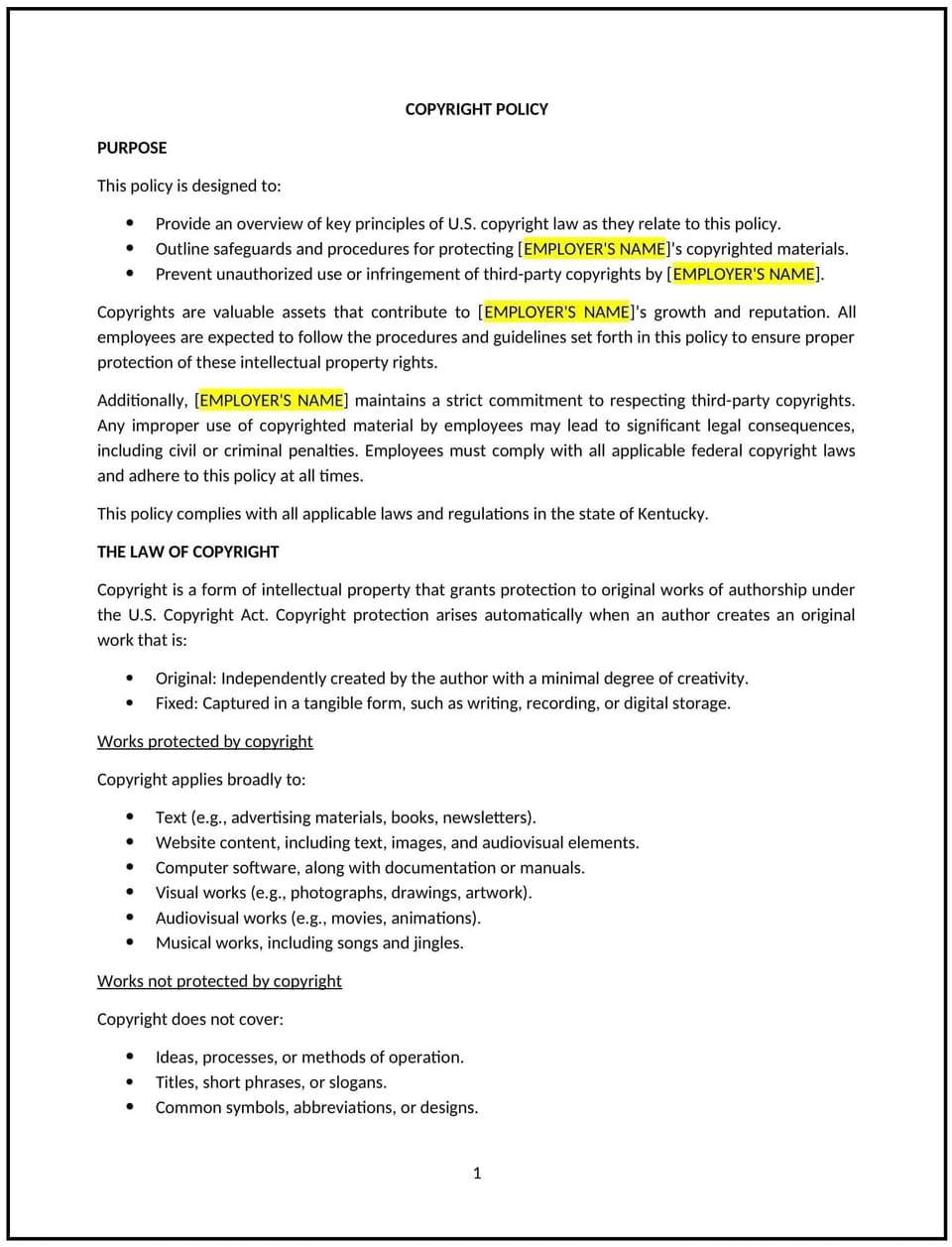Copyright policy (Kentucky): Free template

Copyright policy (Kentucky)
A copyright policy provides Kentucky businesses with guidelines for protecting intellectual property (IP), respecting the copyrights of others, and ensuring compliance with copyright laws. This policy defines the proper use of copyrighted materials, outlines employee responsibilities, and addresses the creation and ownership of original works.
By adopting this policy, businesses can protect their assets, avoid legal risks, and foster a culture of creativity and respect for IP rights.
How to use this copyright policy (Kentucky)
- Define copyright protections: Clearly explain what copyright protects, such as original works of art, literature, software, designs, and other intellectual property.
- Outline ownership rules: Specify who owns works created by employees during their employment, such as whether the business retains ownership or employees hold individual rights.
- Address proper use: Provide guidelines for using copyrighted materials, including licensing requirements, attribution standards, and prohibitions against unauthorized use or reproduction.
- Include fair use considerations: Explain how the policy addresses fair use, such as using copyrighted material for commentary, criticism, or educational purposes under certain conditions.
- Establish reporting procedures: Detail how employees can report suspected copyright infringement or misuse within the organization.
- Explain consequences for violations: Clearly state the potential disciplinary actions for unauthorized use or creation of copyrighted materials, such as warnings or termination.
- Promote training and awareness: Offer education on copyright laws, company policies, and best practices for respecting intellectual property.
Benefits of using this copyright policy (Kentucky)
This policy provides several advantages for Kentucky businesses:
- Protects intellectual property: Safeguards the business’s original works and assets from unauthorized use or reproduction.
- Reduces legal risks: Helps prevent copyright infringement claims and associated penalties.
- Promotes compliance: Ensures employees understand and follow copyright laws and internal policies.
- Encourages creativity: Supports the creation of original works by defining ownership and providing a framework for managing IP rights.
- Builds trust: Demonstrates respect for the copyrights of others, fostering positive relationships with stakeholders.
Tips for using this copyright policy (Kentucky)
- Communicate the policy: Share the policy with employees during onboarding and through regular training sessions to ensure awareness.
- Monitor IP usage: Regularly review how copyrighted materials are used within the organization to ensure compliance with the policy.
- Use copyright agreements: Require employees to sign agreements acknowledging their responsibilities regarding the creation and use of copyrighted materials.
- Encourage proper licensing: Promote the use of licensed materials and provide guidance on acquiring appropriate permissions when needed.
- Review periodically: Update the policy as needed to reflect changes in Kentucky copyright laws, business practices, or industry standards.
Q: What is the purpose of a copyright policy?
A: The policy provides guidelines for protecting intellectual property, respecting the copyrights of others, and ensuring compliance with copyright laws.
Q: What does copyright protect?
A: Copyright protects original works such as art, literature, music, software, designs, and other creative expressions fixed in a tangible medium.
Q: Who owns works created by employees during employment?
A: The policy specifies ownership rules, often stating that works created as part of employment are owned by the business unless otherwise agreed.
Q: How does the policy address fair use?
A: The policy outlines fair use considerations, allowing limited use of copyrighted material for purposes like commentary, criticism, or education under certain conditions.
Q: What happens if an employee violates copyright laws?
A: Violations may result in disciplinary actions such as warnings, suspension, or termination, depending on the severity of the issue.
Q: How can employees report copyright misuse?
A: Employees can report suspected copyright infringement or misuse through designated channels, such as their manager or compliance officer.
Q: How often should the copyright policy be reviewed?
A: The policy should be reviewed annually or as needed to reflect changes in Kentucky copyright laws or business practices.
Q: What training is provided on copyright compliance?
A: Employees receive training on copyright laws, proper use of copyrighted materials, and best practices for respecting intellectual property.
This article contains general legal information and does not contain legal advice. Cobrief is not a law firm or a substitute for an attorney or law firm. The law is complex and changes often. For legal advice, please ask a lawyer.


